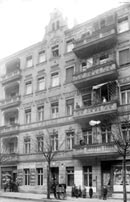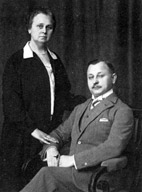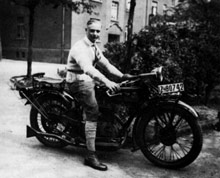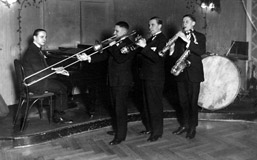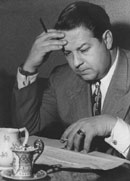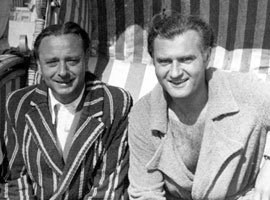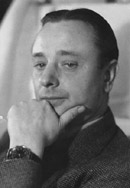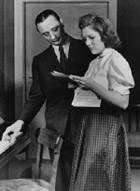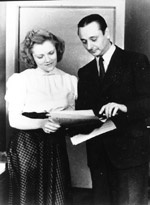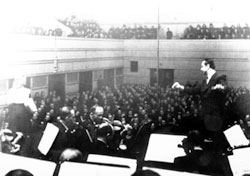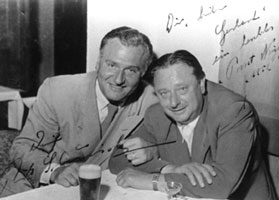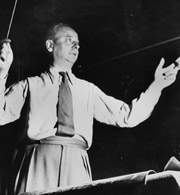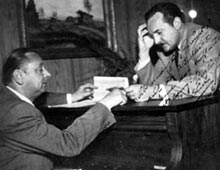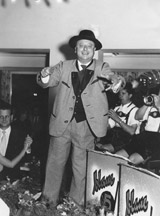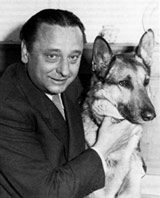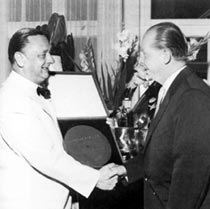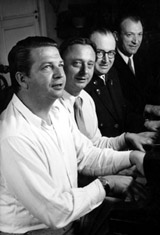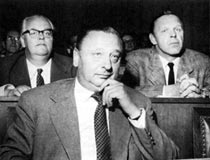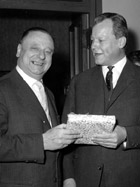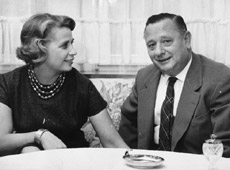
Stephan Pflicht:
The Gerhard-Winkler-Chronicle
1912 His mother and father stem from Silesia and play family music. They both have good singing voices and his father also playing the zither. They support their son's apparent musical talent and buy a piano for him. 1913 at the primary school, where Gerhard Winkler has been going since 1912, a music teacher supports his love of music over and above normal lessons, giving him private tuition and plays the organ together with him. Gerhard Winkler composes his first song with his own words: a song for zither called An meinen Buchfink .
1918 Early in the year the Berliner Hof- und Domchor goes on concert tour in Switzerland. Gerhard Winkler belongs to the singers chosen for the tour. 1919 during the early post-war years Gerhard Winkler sings with the children's choir of the opera house in Berlin »Unter den Linden«, participating in such operas as »Carmen«, »Der Wildschütz«, »Königskinder« and »Der Evangelimann«. This will be the foundation of his love of opera, awakening his ambition of becoming a singer. 1920-21 Gerhard Winkler is confirmed on 22nd September in the Dreifaltigkeitskirche (Trinity Church) in Berlin. His voice breaks, putting an end to his choir singing and his parents press him to take up a serious career. In view of his musical talent he is to be apprenticed to a piano maker and instrument dealer. During a visit to the company his father realises how physically strenuous piano transporting is. He doesn't want to put his son to this and decides to send him into the trade of music supply. Gerhard Winkler takes up his apprenticeship with the Berlin music publisher Richard Birnbach, going on to join the retailer and publisher Robert Rühle after a few months, where he is employed as apprentice from 1st October 1920 to 30th September 1922. 1922 On 1st October Gerhard Winkler starts working as assistant for his master on a half day basis, thus being given the opportunity of pursuing his private music studies in the afternoons. He now pays regular visits to the Englersche Konservatorium at Zossener Strasse 55 and studies piano and violin under Professor Richard Engler as well as music theory and composition under Professor Friedrich Hoyer. 1923 On 14th April the students of the academy give a concert in the Askanische Gymnasium (Askan High School) in Berlin, where the chamber music suite Im Maien is played, including the movements Springendes Bächlein, Blütenduft and Abschied. This is the first public performance of a Gerhard Winkler composition. On 31st August Gerhard Winkler leaves the retailer and publisher Robert Rühle in order to dedicate himself solely to his musical education at the Englersche Music Academy. Attempts at establishing himself with choir and piano music fail so that Gerhard Winkler turns to music for dance and entertainment. 1924-30 Gerhard Winkler himself described this period in his life as the years of apprenticeship and travel. He seeks to prove himself in practise and takes every opportunity of playing in Berlin pubs and taverns and at private celebrations, collecting experience on the piano. He also studies the »Kinothek«, a collection of themes edited by Guiseppe Becce, composer and musical director, to accompany silent movies and he uses this experience as a pianist in silent movie cinemas. Gerhard Winkler then works as pianist and composer in spa orchestras, dance bands, café and bar ensembles, as for example the Binz spa orchsetra on Rügen and soon after his own band in the Weinhaus Traube and the Arcadia Bar in Essen. He is introduced to the famous dance and show orchestra Hans Bund and Bernhard Etté and composes arrangements for them from his unpublished dance composition Trance Blues .
He is asked to play on the Island of Norderney, in Mannheim, Elberfeld, Wiesbaden and Mainz. When Julian Fuh's orchestra plays in nearby Frankfurt, Gerhard Winkler travels there especially to learn the so-called jazz symphonic style of this orchestra. The first print editions of Gerhard Winkler's compositions were the waltz songs In meinem Herzen klingt ein kleines Lied and Heut ist uns alles egal, published in 1930 by F.Marxen in Mainz. 1931 After having got into contact with the Berlin music publisher Ernst Wengraf, for whose Monopol_Liederverlag he writes several orchestra arrangements as well as some of his own songs, Gerhard Winkler returns to Berlin. Here he has his first big success with the students' song potpourri in three quarter time Es zogen drei Burschen, which appears in print just like his foxtrott Ein Glas voll mit Wein, published by the Monopol-Liederverlag. Gerhard Winkler also leads a dance band, works as cabaret piano player and accompanies songs, appearing with, e.g. Otto Reutter, Claire Waldorf, Martha Hühner and Hedda Herrnfeld. Stephan Pflicht:
The Gerhard-Winkler-Chronicle 1932-33 In Berlin Gerhard Winkler makes himself a name arranging music and works for such well-known orchestras as Paul Godwin, Mitja Nikisch, Ilja Livschakoff and Adolf Ginsburg as well as for various music publishers such as Adolf Fürstner, Efi-Ton-Verlag, Edition Eichler & Tetzlaff and the Bohème Verlag in Vienna. The following compositions also appear in print:
1934-35
Gerhard Winkler writes the music for Carl Boese's films »Meine
Frau, die Schützenkönigin« with the songs Bayrischer
Dirndl-Walzer
Wanting to increase his knowledge of music theory Gerhard Winkler joins a special class of the outstanding music teacher Gustav Bumcke at the Sternsche music academy in Berlin from October 1934 to February 1935. The following compositions also appear in print:
With this series Gerhard Winkler proves that he is especially qualified for light concert music and that he has a special talent for folkloristic effects, particularly for Italian colour. Wilhelm Gebauer's Leipziger Musikverlag publishes Gerhard Winkler's SO (Salon Orchester) arrangement of »In München steht ein Hofbräuhaus«, the light waltz written in this year by Wiga-Gabriel , words by Klaus S. Richter and Fritz Reiter, which is known all over the world today. Some of Gerhard Winkler's
compositions are published by large houses in Italy, e.g. Bei
Tanzmusik im Strandhotel This year also sees the
beginnings of co-operation with the singer Rudi Schuricke, who records the foxtrot
Bei Tanzmusik im Strandhotel,
the slow waltz Der
Tag geht zur Ruh The journal »Unterhaltungsmusik« ("Light music") reports on Gerhard Winkler's specific work for advertising films in the thirties: »He was given a task demanding special aptitude: the advertising film. The essence of this is conciseness and the power of persuasion on the shortest yardage. Obviously, music can be a great support.« Within two years Gerhard Winkler writes the music for more than three hundred advertising films. These include a film made for South America. Winkler had to compose music with a South American atmosphere. It was a great compliment to his talent asking Winkler to write music, say, for people in Buenos Aires or Rio in a language familiar to them. The last big assignment was the musical supervision of the first all-evening advertising film for the Auto-Union »Jahr der Arbeit - Jahr des Erfolgs« ("Year of work - year of success") first released in early December in Berlin. The following compositions also appear in print:
Gerhard Winkler writes the
music to Heinz Helbig's Film »Monika«, released in 1938, including
the songs Puppen-Parade
The series »Klänge
aus aller Welt« is continued with Japanisches
Teehaus The following compositions also appear in print:
1938 On 10th March Gerhard Winkler marries Edith Haase, daughter of a cabinet maker, in Berlin-Lichtenfelde. He had been introduced to her in the house of his Berlin publisher Erwin Paesike, whose sister-in-law was married to one of Edith Haase's brothers. In June the Schuricke Trio
records Gerhard Winkler's composition 0
mia bella Napoli under the title
Straßensänger von Neapel
During the next few years
Scampolo
After many successes Peter
Igelhoff, bar singer, pianist and composer; creates his version of Gerhard Winkler's
chanson Das
Nachtgespenst The series »Klänge
aus aller Welt« is continued with No. 9,
Holländischer Holzschuhtanz
The following compositions also appear in print:
During the following years
Frühling
in der Toskana With Santa
Maria The following compositions also appear in print:
Stephan Pflicht:
The Gerhard-Winkler-Chronicle 1940
The Chianti-Lied
»Klänge aus
aller Welt« is completed with No. 13 Blütenfest
in Japan Ständchen
am Morgen
The following compositions also appear in print:
1941
Gerhard Winkler writes a slow waltz for the Swedish baritone Sven Olof Sandberg
Und
wieder geht ein schöner Tag zu Ende Doing his duty in military support Gerhard Winkler writes a choral piece, Heiliges Vaterland, to the words of Bruno Balz, a »Hymne für Fliegerstimmen und Militärmusik«, which is first performed under his direction by the soldiers and the music corps of the air base at Königsberg/Neumark. Gerhard Winkler's march
Unser
Kommandeur Gerhard Winkler's work for military support also involves the organisation of entertainment programs in which many well-known artists appear, including Käthe Heidersbach from the Berliner Staatsoper, Ilse Werner, Grethe Weiser, Kirsten Heiberg, Tatjana Sais, Lizzi Waldmüller, Theo Mackeben, Friedrich Schröder, Hilde Seipp, Erwin Bootz, Peter Schaeffers, Bruno Balz, Aldo von Pinelli, Klaus S. Richter, Claire Schlichting as well as Otto Stenzel with the Orchestra of the Berliner »Scala« and Willi Schaeffers with his Berliner »Kabarett der Komiker«. Hermann Frey, the Berlin
original who had written many texts for the composer Walter Kollo, wrote the
words for Gerhard Winkler's folksy song Im
Goldnen Löwen war's zu Sankt Goar Print editions also appear of his compositions:
1942 In May Gerhard Winkler meets 21 year old Magda Hain, who works for Siemens, sometimes appearing as hobby singer at small events and who sings for injured soldiers. The composer is so impressed by her unspoilt coloratura voice that he persuades her to try her luck as a professional singer and, together with Ralph Maria Siegel, writes a repertoire of songs especially for her. For a text by Günther Schwenn,
with whom he had worked before and with whom he was to work in friendly co-operation
for decades to come, Gerhard Winkler writes Mach
dir um mich doch bitte keine Sorgen (Ein Brief aus der Heimat)
Gerhard Winkler, who has by now been posted to Berlin where he works for the air force film, signs an exclusive contract with Magda Hain on 10th Ocober. In the same month he conducts
Magda Hain's first recording with Die
Vöglein im Prater On 20th December Magda Hain apears at a public concert in the large studio at Berliner Rundfunk, singing these songs conducted by the composer. She is a sensational success. The following compositions also appear in print :
1943-44
Magda Hain gives up her office job to have sufficient time for her singing career
and Gerhard Winkler writes the following songs for her Großmütterlein
Gerhard Winkler publishes
his song collection »Briefe des Herzens« with the three songs Mach
dir um mich doch bitte keine Sorgen (Ein Brief aus der Heimat) Gerhard Winkler goes on tour with Magda Hain for military support in France, Russia, Denmark, Finland and Norway. In January 1944 Gerhard
Winkler conducts Magda Hain's recording of the duos he composed for her with
words by Herbert Ernst Groh Wenn
die Geigen singen During the last year of war Gerhard Winkler works in program planning for the army broadcasting station in Berlin. The following compositions also appear in print :
1945 Gerhard Winkler witnesses the capture of Berlin from his home in Berlin-Wilmersdorf; Nassauische Straße 61. Soon afterwards he is working for Berliner Rundfunk in Masurenallee, under Soviet administration. He writes music for radio dramas and arrangements for the big orchestra of Berliner Rundfunk, conducted by Otto Dobrindt, occasionally conducting studio recordings and public performances himself.
As musical director Gerhard Winkler writes several numbers for the first night of the Berlin post-war cabaret »Tric-Trac« founded by the text writer Fritz Beckmann in the Astor cinema on the Kurfürstendamm, for example Wenn unsre Träume. This composition and also Die Sprache der Liebe, with words by Günther Schwenn appeared in the Peter Scheffer Musikverlag and belonged to the first music publications after the war Gerhard Winkler also works as free lance composer in Berlin, appears as pianist in American officers' clubs and composes the music for the comedy »Herzkönig« by Hemut Weiss, Curth Flatow supplying the song texts. Gerhard Winkler's songs Capri-Fischer and O mia bella Napoli are Nos. 17 and 18 in the 1945/46 hitparade . Stephan Pflicht:
The Gerhard-Winkler-Chronicle 1946
On 19th January the big light orchestra of the Berlin Rundfunk under Kurt Reimann
plays the first performance of Gerhard Winkler's song Die
Gondeln am Lido On 29th March the first stage performance of Gerhard Winkler's musical comedy »Herzkönig« with Rudolph Platte and Lisa Lesco in the main parts is put on in the Schiffbauerdamm-Theatre, Berlin. The performance has to begin early at 5.30 p.m. because of the power cut-off in the evenings. In consideration of the occupying powers the program is also written in Russian, English and French.
The overture to »Herzkönig«
appears as a separate edition in print as well as the following numbers: Einmal
etwas Großes erleben, Schweb' ich im Walzer, Was auf dieser Welt passiert,
Über allem steht die Liebe und Wie
kann ein Mann sich so verändern Gerhard Winkler's song Capri-Fischer reaches No. 1 on the best seller list of 1946/47. According to STAGMA statistics, later GEMA, there are 12,000 live performances of Capri-Fischer in the time between May 1945 and June 1946 in Germany. Add to this the unknown number of times the record is played on German radio stations in the same period of time. Print editions also appear of the compositions :
1947
To increase the repertoire of light concert music Gerhard Winkler publishes
a collection of 12 little concert pieces with the title »Teekonzert«:
In
fröhlicher Gesellschaft Apart from the songs for
Kurt Reimann and Rudi Schuricke Gerhard Winkler also composes songs for Magda
Hain, of which Möwe,
du fliegst in die Heimat Skandal
im Harem Some of the songs from the
musical comedy »So gut wie verlobt« by Gerhard Winkler, which was
never put on stage, appear in print: Tanzmusik,
Endlich allein Following the success of Gerhard Winkler's musical version of the comedy »Herzkönig« by Helmut Weiss, the story is filmed with Hans Nielsen and Lise Lesco in the main parts. Gerhard Winkler writes the songs for this film produced by the author, Ich bin heut so vergnügt and Wer denkt in seiner Hochzeitsnacht ans Schlafen, which are also published as a booklet, together with the songs both from the stage production and the film: Schweb' ich im Walzer, König deines Herzens and Ja, die Gräfin Melanie (Tratsch- Terzett). Starting in September, Rudolph Platte produces the en-suite performances of the musical comedy in his private theatre »Berliner Volksbühne«. To distinguish himself as stage composer after the success of his musical comedy »Herzkönig« Gerhard Winkler starts work on the composition of a big operetta with the working title »Land ohne Musik«, later appearing under the Titel »Premiere in Mailand«. Gerhard Winkler's song Capri-Fischer stays No. 1 on the 1947/48 hitparade and becomes a world success. Print editions also appear of the compositions :
Ralph Maria Siegel establishes his own publishing company, whose first publication is Gerhard Winklers foxtrot Tegernsee with words by Ralph Maria Siegel. Gerhard Winkler composes
the music for Carl Boese's film »Beate« with the songs Ich
bin nicht liebeskrank and Traum
und Wirklichkeit, as well as the music for the film »Vor uns
liegt das Leben«, produced by Günther Rittau, which the composer then
rearranged for his Oceana-Suite
A collection of 5 sailors'
songs by Gerhard Winkler appears in print under the title »Auf allen sieben
Meeren« with words by G. V. Otten: An
der scharfen Ecke von St. Pauli Gerhard Winkler's titles Capri-Fischer, Skandal im Harem and Möwe, du fliegst in die Heimat are Nos. 3, 10 and 11 on the 1948/49 hitparade. A print editions also appears of his composition :
1949 Over a million print copies of Gerhard Winkler's number one Capri-Fischer have been sold by now in spite of the paper shortage of the post-war years, not counting the additional unknown amount of pirate copies. In April Gerhard Winkler buys a house in Neuhaus on the Schliersee and moves from Berlin to Upper Bavaria in September. With the help of his new partner Traudl Stridde, who is later to become his second wife, the so-called "Winkler-Alm develops into a friendly venue for many celebrities from show business. Gerhard Winkler is divorced on 23rd July in Berlin. Edith Winkler marries the composer and conductor Hans Carste in 1953. Gerhard Winkler and his text writer Ralph Maria Siegel land another Italian hit with the tango Mandolino, Mandolino (In Santa Lucia). Gerhard Winkler composes the music for the film »Das Geheimnis des Hohen Falken«, produced by Christian Hallig, which is first shown in early 1950. On 21st October Gerhard Winkler is elected active member of the advisory council of the GEMA, maintaining this position until 1950. On 27th December Gerhard Winkler's operetta »Premiere in Mailand« is first performed on Hessischer Rundfunk (Hessian Radio), Frankfurt, under the musical direction of Erich Börschel. Only a few months later this work, originally called »Land ohne Musik« and later renamed »Glück nach Noten« saw its premiere on stage in Dortmund. A booklet with titles from
this operetta appear, containing:
Wir leben nur einmal The following compositions also appeared in print:
1950 After the radio performance of Gerhard Winkler's operetta »Premiere in Mailand« in Frankfurt the NWDR in Cologne broadcasts a new radio adaptation by Kurt Feltz on 24th January conducted by Franz Marszalek. The first performance of the operetta »Premiere in Mailand« is put on stage in Dortmund at the Städtische Bühnen on 12th February. It is also played in many other German theatres and also sees numerous radio productions. On 24th March Gerhard Winkler becomes a member of the appraisement committee, the later valuation committee of the GEMA and retains this function until 1956. He also becomes ordinary member of the advisory board of the GEMA and retains this position until 1953. A lack of legal aid for the German author after the lost war is the reason why foreign royalties for Gerhard Winkler's world hit Capri-Fischer are not paid. This is why neither composer nor text writer ever see a penny for the countless records sold in USA with the American text version of the song. From 9th to 14th October a convention of the Confédération Internationale des Sociétés d'Auteurs et Compositeurs (CISAC) takes place in Madrid. It is the first international copyright convention after the War allowing German representatives to take part again. Gerhard Winkler is a member of the German delegation. Gerhard Winkler writes new
songs for recordings with Magda Hain to the words of Ralph Maria Siegel, such
as Der
fröhliche Musikant Successful songs published
in this year are Ich
hab' nur ein Hemd The following compositions also appear in print:
Gerhard Winkler's new Italian song Mandolino, Mandolino (In Santa Lucia) is No. 16 on the 1951 hitparade. The following compositions also appear in print:
1952 On 2nd March Gerhard Winkler marries his companion of many years Traudl Stridde, née Neeße, in Schliersee in second marriage. She has two daughters from her first marriage with Diplom-Ingenieur (graduate engineer) Walter Stridde, Barbara and Beatrix. Gerhard Winkler takes part in the CISAC-Convention in Amsterdam as member of the GEMA from 16th to 21st June. In early June the composer travels to Denmark and Sweden, where Radio Stockholm invites him to conduct the radio orchestra. During the following years Gerhard Winkler is guest conductor for Scandinavian and Dutch radio stations many times. On 22nd July Gerhard Winkler's son Hans Andreas.is born in the second marriage in Neuhaus, Schliersee. Gerhard Winkler completes the unprinted concert piece Der Sonne entgegen, a fantasy for piano and large orchestra, which was already well-known through numerous radio recordings.
The following compositions also appear in print:
1953
On tour in Scandinavia the coloured star Leila Negra sings Gerhard Winkler's
song Mütterlein
From Sweden the song gets
to America where it is called Answer
me Gerhard Winkler's musical comedy »Herzkönig« is produced for television by NWDR, Cologne, with Ekkehard Fritsch and Lisa Lesco in the main parts, broadcast on 12th June.
The Italian song Bella,
bella Donna This song is successful
in Holland and the Scandinavian countries, too, and becomes an international
hit, mainly thanks to the English recording with Vera Lynn called Now
and Forever Gerhard Winkler composes
the songs Südliche
Nächte Gerhard Winkler travels to Essen for the first showing of the film »Südliche Nächte« on 8th September and celebrates a heart felt reunion with one of the most important stages of his apprenticeship in tender years. Gerhard Winkler's new song Frauen und Wein (Italienische Eselsfahrt) is No. 21 in the 1953 hitparade. The following compositions also appear in print:
1954 The Deutsch Komponistenverband (Association of German Composers) is founded for which Gerhard Winkler works many years as a member of the board of directors Gerhard Winkler also becomes member of the arbitration committee for GEMA. Under its American title Answer Me Gerhard Winkler's song Mütterlein reaches the charts on 24th April and belongs to the top Twenty Hits USA 1953-55 and reaches no. 6 on the US hitparade. After this success Fred
Rauch writes a new German text for the song following the American words. Now
it becomes popular under its new title Glaube
mir Taking up the successful
Italian songs Gerhard Winkler writes Nicolo,
Nicolo, Nicolino
On 1st June Gerhard Winkler establishes The Musikverlag Edition Continent together with August Seith in Munich and is joint partner until the end of 1970. In June Traudl and Gerhard Winkler go on their first ship cruise from Bremen to Genoa. Inspired by the games of
his two-year-old son Hans Andreas, Gerhard Winkler composes the concert piece
Kreiselspiel
Ernst Marischka produces
the singer film »König der Manege« with Rudolf Schock, for
which Gerhard Winkler writes the songs Vorhang
auf (Artistenmarsch) On 4th December Traudl Winkler establishes the Musikverlag Edition Fortuna in Berlin, together with Peter Schaeffer and stays joint partner until 1967. Gerhard Winkler's Italian song Bella, bella Donna is No. 6 on the 1954 hitparade. The following compositions also appear in print:
1955
Gerhard Winklers new song Zwei
Spuren im Schnee Gerhard Winkler publishes »Leckerbissen«, a collection of 8 little concert pieces for accordion or piano. Geza von Bolvary produces
a film of the folk play »Mein Leopold« by Adolf L'Arronge with the
same title and Gerhard Winkler writes the music with the songs Und
das alles geschah in der Nacht Mütterlein with a new German text reaches No. 4 on the 1955 hitparade under the title Glaube mir. The following compositions also appear in print:
Stephan Pflicht:
The Gerhard-Winkler-Chronicle 1956 Gerhard Winkler buys a villa in Berlin-Grunewald, Lassenstr. 4, built around the turn of the century by the architect Alfred Messel, well-known for example for the architecture of the Berlin department store Wertheim, for the Wertheim dynasty. In May the family moves back to Berlin from Neuhaus am Schliersee. On 24th May Gerhard Winkler establishes the Transeuropa Bühnen- und Musikverlag (Transeurope stage and musik publishers), which is taken over by Richard Birnbach Musikverlag in 1971. In this year Gerhard Winkler writes the music for 4 films: for »Schwarzwaldmelodie«
produced by Geza von Bolvary with the songs Abschiedsmelodie
(Schwarzwaldmelodie), Dort
wo die grünen Tannen stehn for »Die Rosel vom
Schwarzwald« by Rudolf Schündler with the songs Broadway-Melodie
for »Die Stimme der
Sehnsucht« with Rudolf Schock, produced by Thomas Engel, with the songs
Der
Liebe Freud und Leid (Liebeslied)
as well as for »Die
schöne Meisterin«, a singing film produced by Rudolf Schündler with
the songs Alle Verliebten
singen, Auch der allerschönste Sommer geht zu Ende, Bier-Walzer
On 12th September Gerhard Winkler celebrates his 50th birthday, enjoying great public interest. At this time he is at the height of his popularity. Numerous radio stations and newspaper articles value his compositions highly. On this occasion he is paid the special honour of being awarded a golden disc as recognition of the great success of his records on Polydor, which include the Capri-Fischer.
On 29th September Gerhard Winkler becomes active member of the GEMA valuation committee and remains in this position. Gerhard Winkler's new songs
Wo,
wo, wo liegt Dixieland Mütterlein reaches No.18 on the 1956 hitparade with a new German text and title Glaube mir. The following compositions appear in print:
1957 Gerhard Winkler's operetta »Die ideale Geliebte« is first performed on 2nd March in Nuremburg on the Städtische Bühnen. It is then put on stage in many German theatres and produced by numerous broadcasting stations. In 1958 a single edition of the stage production appears in print including the songs: Pelagua, Ich bin ein Reisender, Caramba, Wir träumen bei singenden Geigen, O Monsieur, Eine Nacht so wie heut, Das Militär, das Militär, Ay, ay, ay, die Sonne brennt sehr (Baumwollpflücker-Lied) and Bella, bella Signorina. On 3rd April Gerhard Winkler becomes full member of the GEMA valuation committee and remains in this position until 1964. In June/July Traudl and Gerhard Winkler go on a sea trip from Hamburg to the North Cape. On 3rd September Gerhard Winkler is awarded the Paul-Lincke ring in the spa town of Hahnnenklee in the Harz. After Friedrich Schröder he is the second composer to be honoured with this award.
Als To express his gratitude
for this honour and in remembrance of his visit to Hahnenklee in the Harz Gerhard
Winkler composes Kleine
Harzer Suite with the movements Rosenhochzeit
in Hahnenklee and Hexentanz
auf dem Bocksberg On 3rd October Gerhard Winkler becomes active member of the GEMA board of directors and maintains this position until 1963. The following compositions also appear in print:
1958
Gerhard Winkler writes Ein
armer Musikant In February Traudl and Gerhard Winkler go on a cruise to West Africa. The composer sells his house in Schliersee, the so-caller "Winkler-Alm" and chooses Berlin as his place of permanent residence. The following compositions also appear in print:
1959 From the end of April to the beginning of June Traudl and Gerhard Winkler go on a banana-boat trip to Ecuador. Gerhard Winkler spends the summer holidays with his family on the Ligurian Riviera, where he works on his new operetta »Der Fürst von Monterosso«. An air trip takes Traudl and Gerhard Winkler to the Caribbean and the USA from October to November. 1960 On 19th February Winkler's operetta »Der Fürst von Monterosso« is first performed at the Städtische Bühnen in Augsburg. It is later performed on many German stages. Gerhard Winkler himself conducts the overture to the performance in Augsburg as well as to many of the premières in other theatres, which he generally liked to do when his stage works were performed. The overture to »Der
Fürst von Monterosso« appears in print as a single edition together
with the song Ballett
im alten Stil: (1)
Gavotte a la Rameau Traudl and Gerhard Winkler go on a journey to East Asia during March and April, travelling to India, Hong Kong, Singapore and Japan. The première of Richard Bush's comedy »Drei Mädchen im Bikini (Liebes-Toto)« at the Theater an der Lutherstraße in Berlin is on 9th June, with music by Gerhard Winkler. It is described as a jolly musical and is a flop. The following compositions also appear in print::
1961-62
Following the suggestion of Franz Josef Strauß, federal minister
of defence, Gerhard Winkler composes the Starfighter-Marsch
Gerhard Winkler acquires a summer property in Campione, Tessin, which he discards, however, after three months in order to buy a summer house in Morcote on Lake Lugano. On the occasion of Hans Carste, composer and conductor, being awarded the Paul-Lincke ring on 2nd September 1961, Gerhard Winkler travels to Hahnenklee. This visit to Hahnenklee in 1959 on the occasion of being awarded the Paul-Lincke ring himself, inspired Gerhard Winkler to write Kleine Harzer Suite, which now appears in print. The following compositions also appear in print:
1963 Gerhard Winkler composes the music for the CCC Television GmbH films »Casanova wider Willen«, »Liebeshändel in Chiozza« und »Jenny und der Herr im Frack«. Gerhard Winkler writes
the song Caroline
The following compositions also appear in print:
On 12th December Gerhard Winkler becomes member of the GEMA board of directors and retains this office until 1967. The following composition also appear in print:
1965 In January Traudl and Gerhard Winkler go on a cruise to the Caribbean and then continue to visit friends in New York. Schenk
mir ein Bild von dir Print editions also appear
of the composition Das
Gästebuch sung by Sascha Distel, two concert pieces under the
title Träumendes
Fischerdorf 1966 On 11th February Gerhard Winkler becomes member of the GEMA tariff committee and stays in office until 1967. Gerhard Winkler takes part at the CISAC Convention from 13th to 18th June as GEMA representative. In the summer Traudl and Gerhard Winkler travel to Norway and Sweden, where the composer conducts the radio orchestra in Stockholm. On 12th September Gerhard Winkler celebrates his 60th birthday in Berlin.
In honour of this anniversary Ariola-Eurodisc produces the LP »Gerhard Winkler Welterfolge« with Kammersängerin Erika Köth and Kammersänger Rudolf Schock as well as the Berliner Symphoniker cunducted by the composer himself. On 25th December the first program of German television broadcasts the show »Gerhard Winkler gibt sich die Ehre«, produced in October and directed by Fred Kraus in Munich. Appearing in the show are Margrit Schramm, Peter Minich, Guggi Löwinger, Peter Kraus, Claudio Nicolai and also Gerhard Winkler. Using his successful compositions Neapolitanisches Ständchen and 0 mia bella Napoli (Straßensänger von Neapel) Gerhard Winkler composes an orchestra suite in three movements with the title Ein Tag in Neapel. The new second movement has the title Napoli bei Nacht. The following compositions also appear in print:
1967 Together with friends from the Berlin tennis club »Zehlendorfer Wespen« Traudl and Gerhard Winkler go on a trip to South America from 6th to 31st March, which takes them to Rio de Janeiro, Sao Paulo, Montevideo, Punta del Este, Buenos Aires, Santiago de chile and Valparaiso. In May Gerhard Winkler spends four weeks in the health resort of Bad Mergentheim. Afterwards Traudl and Gerhard Winkler go on a trip to Norway. On 22nd June Gerhard Winkler becomes active member of the GEMA board of directors and stays in this office until 1971. At the same time he belongs to the GEMA program committee and also stays in this office until 1971. Gerhard Winkler's grandson Steffen is born on 30th September in the first marriage of his step daughter Barbara with Rudolf Mielke, later adopted by her second husband Günther Walch. In March 1968 Traudl and Gerhard Winkler go on a boat trip to the Canaries and to north Africa. On 20th June Gerhard Winkler again becomes member of the GEMA valuation committee and stays in this office until 1972. The concert pieces
Clarina
1969-70 Gerhard
Winkler sells his villa in Berlin and moves to Zollikon near Zurich
in Switzerland. 1970 also sees the building of a house in München Harlaching,
which the family plans as a second base. Gerhard Winkler writes the
music for Hans Heinrich's film »Klein Erna auf dern Jungfernstieg«,
including the songs Jungfernstieg-Marsch
The following compositions also appear in print:
1971 The family move into their new second home in München-Harlaching at Whitsun, the house being sold again in1977. Gerhard Winkler and Magda Hain appear on television again once more together in the series »Stars von damals« of the Süddeutsche Rundfunk in Stuttgart. Because his health suffered increasingly after the journey to south America in 1967, Gerhard Winkler goes into the Mayo clinic in Wiesbaden on 13th October, where cerebral sclerosis is diagnosed after thorough examinations. Gerhard Winkler's co-operation in an Austrian TV production in the ORF studio Ronnacher in Vienna with Zarah Leander, Ilse werner, Peter Igelhoff, Hans fritz Beckmann and others is his last public appearance 1972-73 In April and May 1972 Traudl and Gerhard Winkler fly to New York and Hollywood, where they visit their friends Lisa Lesco and Henry Koster. On 28th June Gerhard Winkler becomes active member of the GEMA valuation committee and stays in this office until 1975. .1974
sees the composition of Valse
Tanja The folk song Der Meisterjodler von Daxenbach, written earlier on and sung by Thomas Scholl, is the last print edition of his works, appearing in 1977. The following compositions also appear in print:
1976 In February Gerhard Winkler acquires a property in Allgäu, where he spends the last months of his life from May to September 1977 at Bremberg, Kempten, being very ill. On the occasion of his 70th birthday Gerhard Winkler is awarded the silver medal of the department of culture of the Italian foreign ministry in recognition of his special services to culture. In his covering letter signed on 4th September , Corrado Orlandi Contucci, then ambassador to the Federal Republic of Germany, says: »Your many compositions steeped in the great love you have for Italy have been a constant part of the German world of music for 40 years now and have surely deepened the obsession for Italy and the wanderlust to the sunny country of your songs. For this we are very much indebted to you.« A new dahlia breed is given the name »Gerhard Winkler« in honour of his 70th birthday. Rolf Wagschal, breeder of this new flower from Hamburg writes: »Amongst the hundreds of seedlings of the year 1973 one plant was especially striking because of its beautiful colour. The petals of the big, bright red flower all had a golden tip. It was a hybrid between a Dutch dahlia and one of our own experimental kinds with the result of a considerable improvement in colour in comparison to the mother plant. After my new breed had successfully passed all examinations I had to give it a name. By chance I heard of Gerhard Winkler's 70th birthday coming up. And since my hobby during my school days before the last war was the popular light and dance music, represented so well by Gerhard Winkler, I decided to name my dahlia after him.« 1977 On 13th May Gerhard Winkler's granddaughter Natalie is born in the marriage of step daughter Beatrix with Bernd Dobler. After two attacks of pneumonia in June and August, Gerhard Winkler dies - shortly after his 71st birthday - on 25th September at 5.25 a.m in the morning,. in his Allgäu holiday home in Kempten. He is borne to his grave in the Neuer Friedhof by many friends and colleagues expressing their deepest sympathy on 28th September. In a letter of condolence the senate in Berlin expresses its deepest sympathy at Gerhard Winkler's death, also for the countless people of Berlin, whom the composer gave decades of joy with his rich musical creations: »Berlin was his home, from here his name spread as composer of countless popular songs, which have long since become evergreens but also as a famous composer of light music throughout the world. Gerhard Winkler will live on in his melodies.« |
Homepage|Biographie|Songs|Contact|Links
The Gerhard Winkler Musikarchive|Fotos/Cartoons
|
Information given in connection with this homepage is for private use. All texts, pictures and music samples belong to the Gerhard-Winkler-Archive and any parties entrusted with the protection of these rights. Any public use requires prior written agreement with the Gerhard-Winkler-Archive and, if necessary, with the copyright holders (Rechteinhaber). |
